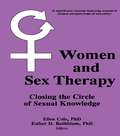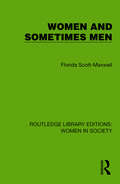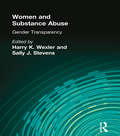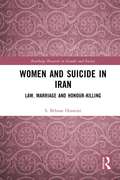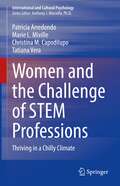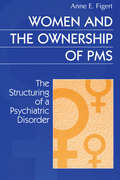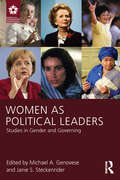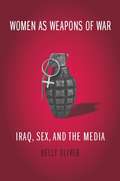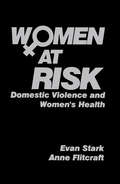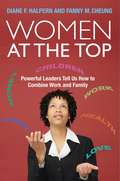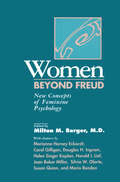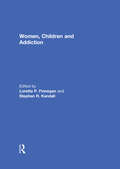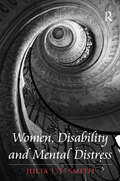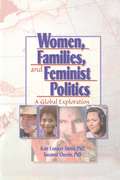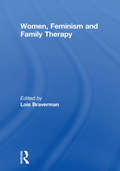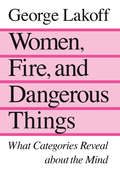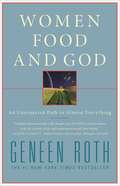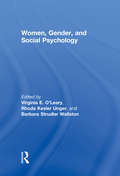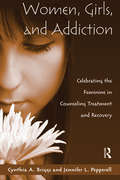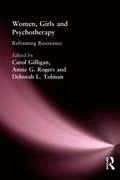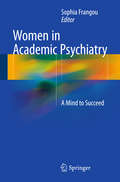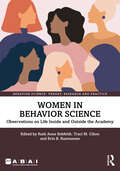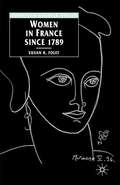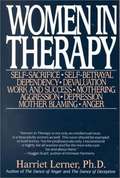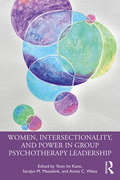- Table View
- List View
Women and Sex Therapy: Closing the Circle of Sexual Knowledge
by Ellen Cole Esther D RothblumOutstanding feminist scholars present seldom discussed women’s views of sexuality. In the past, there has been little feminist discussion among sexuality professionals and between feminist therapists and sex therapists. The valuable ideas expressed by the contributors to this book are aimed at increasing the possibilities for all therapists and counselors to discuss with their clients the nature of sexuality, and in particular, what women feel about sex. Professionals provide remarkable perspectives on issues that concern all women--orgasm, the double standard, new reproductive options, intimacy, bisexuality, and more.
Women and Sometimes Men (Routledge Library Editions: Women in Society)
by Florida Scott-MaxwellOriginally published in 1957, in Women and Sometimes Men, the author accepts the findings of modern psychology that every man and woman is both masculine and feminine. Her book is about the relationship of these two, both in society and within the individual at the time. She believes that the relationship in either case could be better than it is; that the pressures of our times lead many women to live – or be lived by – their masculine sides. The balance is disturbed in the individual, in marriages, and in society. The pressures will not cease and a new harmony cannot be found without a self-understanding that is sometimes painful, and an understanding of the opposite sex which greatly depends upon self-knowledge.It is such an understanding which this book offered: insights and reflections based on a long experience of life and of the practice of analytical psychology. It is an expansion of a series of talks originally broadcast in the BBC Third Programme, and which only those who believe they are already the most fulfilled and fulfilling person, wife, husband, parent, could afford to ignore.This book is a re-issue originally published in 1957. The language used and views portrayed are a reflection of its era and no offence is meant by the Publishers to any reader by this re-publication.
Women and Substance Abuse: Gender Transparency
by Harry K Wexler Sally J StevensIn Women and Substance Abuse: Gender Transparency you’ll see what can be done to aid women in some of the world’s hardest hit substance abuse hubs, including Rio De Janeiro, Brazil; Philadelphia, Pennsylvania; and New Haven, Connecticut. Filled with timely research and practical solutions, this volume shows you what you can do to aid the tremendous and immediate need for specialized interventions in the lives of women.Women and Substance Abuse considers many of the variables in the lives of women who abuse drugs--race, choice of drug, HIV risk, and drug treatment history--and gives you line-by-line proof of the need for custom-tailored harm reduction strategies for addicted women who are and who aren’t engaged in drug treatment therapy. In addition, you’ll see why frequent cocaine use, current physical and sexual abuse, and concerns relating to children can alter the success of therapies and treatments. Overall, this unique volume will broaden your understanding of the subject by covering: gender differences in risk for gonorrhea infection risk factors for women who trade sex for drugs and money the role of physicians and prenatal care providers of substance abusing women how drug treatment programs can be more multifacted to include planning, prenatal care, and parenting skills prison-based therapeutic communities long-term residential treatment for women with children, pregnant women, and women without childrenFor every unique woman with a drug problem, there is a unique treatment. Women and Substance Abuse turns away from the lost cause of blanket treatments and takes you into the world’s slums and inner-city ghettoes, where the faces of addiction are as diverse as the women who bear its debilitating burdens. You’ll see women’s drug addiction for what it is--a montage of suffering and pain that only individual and specialized care can cure.
Women and Suicide in Iran: Law, Marriage and Honour-Killing (Routledge Research in Gender and Society)
by S. Behnaz HosseiniDrawing on feminist theory, as well as theory surrounding the correlation between poverty and suicide, this study explores the increased rate of suicide among women in western Iran. Based on empirical research, including interviews with women from the Kurdish region of the country, the author considers the marginalisation of Kurdish populations in Iran, the suppression of their rights, and violence against women in its various forms. With attention to family violence, such as direct physical or sexual assault, psychological bullying or through practices such as forced marriage or honour killings, the author also considers the political nature of such violence, as certain violent practices are enshrined in the Iranian constitution and legitimised in jurisprudential practice. A study of gendered violence and its effects, Women and Suicide in Iran will be of interest to scholars working in the fields of Sociology, Criminology and Middle Eastern Studies with interests in violence, gender and suicide.
Women and the Challenge of STEM Professions: Thriving in a Chilly Climate (International and Cultural Psychology)
by Patricia Arredondo Marie L. Miville Christina M. Capodilupo Tatiana VeraThis timely volume identifies factors that impede the success of women in STEM professions and demonstrates the negative impact of sexual harassment on women’s physical health, mental health, and job performance. Focusing specifically on the narratives of women in higher education, the authors illuminate the structural and systemic barriers facing women working as graduate students, faculty, and administrators. Drawing on insights from the #metoo and #timesup movements as well as the Brett Kavanaugh Senate hearings, this book:Provides real-life narratives as clarifying examplesValidates the experiences of women struggling to negotiate the STEM workplaceRecommends specific helpful practices for both women and employers .This book will be a valuable resource for those in academia and the workplace, and serve as an illuminating of women's experience generally.
Women and the Ownership of PMS: The Structuring of a Psychiatric Disorder (Social Problems And Social Issues Ser.)
by Anne FigertThis is the first book-length account of the controversy preceding and following the APA’s decision in 1986 to include a premenstrually related diagnosis in its revised diagnostic manual, DSM III-R. Figert examines why the decision was controversial and consequential in three main domains where people, their interests, and claims to ownership coincide: the Health and Mental Health Domain, the Woman Domain, and the Science Domain.
Women as Political Leaders: Studies in Gender and Governing (Leadership: Research and Practice)
by Michael A. Genovese Janie S. SteckenriderOver the past several years, the fields of Leadership Studies and of Women's Studies have grown tremendously. This book, which is a series of case studies of women who have headed governments across the globe, will discuss the conditions and situations under which women rose to power and give a brief biography of each woman . A special chapter on why no U.S. woman has risen to the top, and a review of the political campaigns of Hillary Clinton, Michele Bachmann and others will be included. This book will be of interest for courses in women and leadership, global politics and gender studies.
Women as Weapons of War: Iraq, Sex, and the Media
by Kelly OliverEver since Eve tempted Adam with her apple, women have been regarded as a corrupting and destructive force. The very idea that women can be used as interrogation tools, as evidenced in the infamous Abu Ghraib torture photos, plays on age-old fears of women as sexually threatening weapons, and therefore the literal explosion of women onto the war scene should come as no surprise. From the female soldiers involved in Abu Ghraib to Palestinian women suicide bombers, women and their bodies have become powerful weapons in the Afghanistan and Iraq wars. In Women as Weapons of War, Kelly Oliver reveals how the media and the administration frequently use metaphors of weaponry to describe women and female sexuality and forge a deliberate link between notions of vulnerability and images of violence. Focusing specifically on the U.S. campaigns in Afghanistan and Iraq, Oliver analyzes contemporary discourse surrounding women, sex, and gender and the use of women to justify America's decision to go to war. For example, the administration's call to liberate "women of cover," suggesting a woman's right to bare arms is a sign of freedom and progress. Oliver also considers what forms of cultural meaning, or lack of meaning, could cause both the guiltlessness demonstrated by female soldiers at Abu Ghraib and the profound commitment to death made by suicide bombers. She examines the pleasure taken in violence and the passion for death exhibited by these women and what kind of contexts created them. In conclusion, Oliver diagnoses our cultural fascination with sex, violence, and death and its relationship with live news coverage and embedded reporting, which naturalizes horrific events and stymies critical reflection. This process, she argues, further compromises the borders between fantasy and reality, fueling a kind of paranoid patriotism that results in extreme forms of violence.
Women at Risk: Domestic Violence and Women's Health
by Evan D. Stark Anne FlitcraftBattering by men is the most significant cause of injury to women in our society. It is also a major cause of child abuse, murder, substance abuse and female suicide attempts. This volume, the result of 15 years of research conducted by the authors - a social worker and physician respectively - explores the theoretical perspectives of this dramatic expression of male domination, together with health consequences for women and clinical interventions. The authors found that the traditional resources women turn to for help reinforce male domination: the medical, psychiatric and behavioural problems presented by battered women arise because male strategies of coercion, isolation and control converge with discriminatory structur
Women at the Top
by Diane F. Halpern Fanny M. CheungUsing case studies of top-level women and research in the field, Women at the Top breaks new ground and offers new insight into how women can create dually-successful lives.explores the work histories, motivation, leadership styles, mentors, and family backgrounds of a diverse assortment of top-level womenincludes the case studies of the President of Old Navy/Gap, the Chairman of Deloitte and Touche, the VP of IBM operations, a Supreme Court Judge in China, President of Legislative Council in Hong Kong, several university presidents, and moreweighs the positive effects of multiple roles and positive and negative work-life spill overdiscusses strategies for success (e.g., scaling back, juggling), the need for social support, and the importance of cultural context
Women Beyond Freud: New Concepts Of Feminine Psychology
by Milton M. BergerFirst published in 1994. This volume contains the proceedings of a historic meeting, attended by over 2,000 mental health professionals and lay people, to mark the fiftieth anniversary of the founding of the Karen Horney Psychoanalytic Centre in New York City. Each contributor to this book offers unique insight into the seminal work of Karen Horney, one of the first psychoanalysts to question Freud's male-centred theories and clinical practices.; The book includes accounts of the formative girlhood experiences that awakened Horney's spirit of independence and the intellectual and cultural currents of her time that influenced her work. A contribution by a Preeminent Sex Therapist Challenges The Notion That Liberated Women threaten the potency of men. Other contributors define the characteristics of relationships that foster or hinder women's psychological growth and discuss the conflicts faced by adolescent girls as they become aware of gender differences.
Women, Children, and Addiction
by Loretta P. Finnegan Stephen R. KandallThis proposed book draws on the expertise of 35 experts in the field of Addiction Medicine to provide the reader with a current and comprehensive view of addiction as related to women, pregnancy, newborns, infants and children. The volume begins by placing current attitudes towards addicted women in a historical context, and continues with contributions on the relationship of gender to substance abuse research, addiction as a general health issue in women, and ethical dilemmas faced when approaching drug use during pregnancy.The volume discusses high-risk pregnancies and HIV infection related to maternal drug abuse. It details specific pharmacotherapy such as methadone and buprenorphine, and assesses society’s punitive view toward illicit drug using women. Finally, the book describes outcomes of newborns, infants and children born following intrauterine drug exposure.Health providers in many related disciplines, specialists in Addiction Medicine, social workers and ethicists are among those who will gain insight into the complex interdisciplinary matrix of abuse in women, its unique relationship to pregnancy, and its impact on drug-exposed children.This book was published as a special issue in the Journal of Addictive Diseases.
Women, Disability and Mental Distress
by Julia L.T. SmithOver recent decades an increasing amount of attention has been paid to identifying and meeting the individual support needs of mental health service users and people with physical impairments in the UK. Evidence of this can be seen within the literature that considers mental health and physical impairment from a wide range of perspectives, as well as the increased range of service provision for individuals within both categories. However, the support needs of individuals who fall into both categories have largely been overlooked by social care and health service providers, practitioners, and organisations for whom the main focus is either mental health or physical impairment. The lack of attention that has been given in theory and in practice to the mental health support needs of disabled women who experience mental distress has resulted in an insufficient knowledge base of how to support disabled women who may require some form of mental health support. For this group of women this has meant that their needs have arguably continued to be neglected and subsequently left unmet. Writing from her position as both a social worker and a service user, Julia Smith has written an innovative and important text which both discusses a neglected area of personal experience and makes an original contribution to knowledge with regard to both policy and practice.
Women, Families, and Feminist Politics: A Global Exploration
by J Dianne Garner Suzanne CherrinWomen and their roles within families must be understood within the context of ethnic traditions, religion, and culture. Women, Families, and Feminist Politics: A Global Exploration combines all of these aspects to evaluate the similarities and differences of women around the world. Readers will learn about diverse theories relating to women and their familial roles, the different categories of feminism, and how cultures and ethnic traditions shape and sometimes restrict a woman’s identity. Using feminist and sociocultural theories to critically examine the role of adult women within their families, Women, Families, and Feminist Politics offers ideas and suggestions on what has to be done in order for all of women’s experiences and concerns to be valued and looked upon as important. In addition to providing you with an understanding of how customs and cultures contribute to societal standards set for women, Women, Families, and Feminist Politics discusses several factors that contribute to the formation of women’s roles and identity, including: the economic situation of the family and the country in which the woman lives (a developed or developing country) cultural diversity in monogamous heterosexual marriage relations and specific marriage traditions, such as dowries family structures, such as nonnuclear, extended, polygamous, mixed religion relationships, mixed race relationships, or same-sex relationships reproduction and sexual standards in relation to religion, government policies, and world population gender equity in the workplace and programs for women in global development the health care needs of women and how they vary depending on culture, political philosophies, and resources women and violence in societal and family contexts, from war rapes, female circumcision, and footbinding to battery and sexual harassmentWomen, Families, and Feminist Politics looks at the daily challenges and concerns of adult women within the context of family to help you understand the different needs of women in relation to their culture and ethnic background. Focusing on the importance of views concerning the meaning of women’s social status, power, and success, Women, Families, and Feminist Politics contains case studies and statistical data that identify critical issues pertaining to you personally and to all women throughout the world. By understanding how women’s families help shape their identities, you will be able to learn about the vast experiences of women and the inequalities we have yet to overcome.
Women, Feminism and Family Therapy
by Lois BravermanWomen, Feminism and Family Therapy encourages sensitivity to feminist perspectives and challenges many traditional notions held by therapists, clients, and society. One of the few guides that takes into account feminist ideals and the changing status of women in society, this provocative new book explores a feminist approach to theory, clinical applications, training, and supervision in family therapy. Topics in this exciting and though-provoking book include women in alcoholic families, women and abuse in the family context, lesbian daughters and mothers, and women and eating disorders. Editor Lois Braverman and the other expert contributors are practicing psychotherapists who have struggled with the problems of integrating a feminist perspective with the practice of family therapy. Their discussions--both theoretical and practical in scope--provide professionals with actual treament interventions, as well as a frank discussion of theoretical dilemmas.
Women, Fire, and Dangerous Things: What Categories Reveal about the Mind
by George Lakoff"Its publication should be a major event for cognitive linguistics and should pose a major challenge for cognitive science. In addition, it should have repercussions in a variety of disciplines, ranging from anthropology and psychology to epistemology and the philosophy of science. . . . Lakoff asks: What do categories of language and thought reveal about the human mind? Offering both general theory and minute details, Lakoff shows that categories reveal a great deal."—David E. Leary, American Scientist
Women, Food and God: An Unexpected Path to Almost Everything
by Geneen RothThe bestselling author of "When Food Is Love" helps overeaters find the underlying reasons for using food as an emotional buffer. Roth also provides seven basic guidelines for eating and other therapeutic self-help tools.
Women, Gender, and Social Psychology
by Virginia E. O'Leary, Rhoda Kesler Unger and Barbara Strudler WallstonFirst published in 1985. Routledge is an imprint of Taylor & Francis, an informa company.
Women, Girls, and Addiction: Celebrating the Feminine in Counseling Treatment and Recovery
by Cynthia A. Briggs Jennifer L. PepperellWomen, Girls, and Addiction is the first book on the efficacy of treatment approaches and interventions that are tailored to working with addicted women, and the first publication of any kind to provide a feminist approach to understanding addiction from the female perspective. Part one provides an overview of feminist theory and addiction counseling, followed by an historical look at women and addiction. Part two gives an in-depth look at the biological, psychological, and social factors. The final section presents a series of chapters spanning the lifespan, which each feature age-specific special issues, treatment strategies, interventions, and commonly encountered topics.
Women, Girls & Psychotherapy: Reframing Resistance (Women And Therapy Ser.)
by Carol Gilligan Annie G Rogers Deborah L TolmanAdolescent girls’special needs in the teen-age years are thoroughly examined in Women, Girls & Psychotherapy, a compelling book focusing on the vitality of resistance in young girls. Drawing on studies of women’s and girls’development, clinical work with girls and women, and their personal experiences, the voices of adolescent girls are used to reframe and greater understand their resistance against debilitating conventions of feminine behavior. As adolescent girls are often overlooked in feminist books in psychotherapy, this is an important volume as it looks positively at resistance, both as a political strategy and a health-sustaining process.The chapters cover such diverse topics as reconceptualizations of women’s and girls’psychological development and the psychotherapy relationship; adolescent female sexuality; new approaches to psychological problems commonly seen in girls and women; female adolescent health; and diverse perspectives and experiences of growing up female. The voices of young women are increasingly important in the exploration of the field of psychotherapy and among the voices included are those from African-Americans, Asian-Americans, and lesbians. An enlightening look at resistance in females in the growing up years, this volume provides valuable insight on their experiences. The work of many researchers,therapists, and educators with diverse backgrounds, Women, Girls & Psychotherapy is an informative book on distinct psychological issues facing young females.
Women in Academic Psychiatry
by Sophia FrangouThis text comprises of sixteen first-person narratives from some of the most influential women in psychiatry about why they went into the field, what they attribute to success, and how they overcame their challenges. The second part of this text analyzes the themes brought to light in the narrative and discusses strategies for success. Though several of the chapters target issues that women in academic psychiatry may not have a resource for, several of the chapters discuss challenges that both men and women face, including strategic actions and decisions and the time investment necessary for a successful career in academic psychiatry. The topics are relevant to medical professionals at every level of their career who are or work with women in the field. Women in Academic Psychiatry is a unique resource for the professional woman in psychiatry, psychology, medical school, for men who face particular career challenges in academic medicine or are cultivating young women who are eager to succeed.
Women in Behavior Science: Observations on Life Inside and Outside the Academy (Behavior Science)
by Ruth Anne Rehfeldt Traci M. Cihon Erin B. RasmussenWomen in Behavior Science is a unique text that showcases the perspectives, stories, and lessons of notable female behavior scientists at all stages of their careers, with relevance for the field’s many women pursuing careers in academia today. With the insights of esteemed female behavior scientists from diverse backgrounds, the book brings together their challenges and successes to include their own distinct perspectives on their professional and personal development. The book includes three sections that span the different phases of the academic lifespan from graduate school to retirement and post-retirement. Each section covers a wide range of topics such as expanding one’s work in new and diverse areas; deciding when and how to make transitions; making something out of nothing or very little; navigating relationships with family, children, and life partners both inside and outside of academy; values-based living; how to thrive in competitive environments; and building values-consistent repertoires in settings that may be gender-marginalizing. Presenting a behind-the-scenes view of academia, the authors also provide open and vulnerable narratives about their psychological and socio-cultural experiences, their stories of marginalization, their difficulties with mental and physical health challenges, grief and loss, and caring for others with chronic health conditions. Reframing the cultural-level recognition of female behavior scientists today, this book is essential reading for graduate and postgraduate students of Behavioral Science, especially for those focusing on diversity and cultural issues. It is also a must-read for professionals interested in understanding the experiences of diverse groups in this field.
Women in France since 1789
by Susan K. FoleyThis compelling study traces the changes in women's lives in France from 1789 to the present. Susan K. Foley surveys the patterns of women's experiences in the socially-segregated society of the early nineteenth century, and then traces the evolution of their lifestyles to the turn of the twenty-first century, when many of the earlier social distinctions had disappeared. Focusing on women's contested place within the political nation, Women in France since 1789 examines: - the on-going strength of notions of sexual difference - recurrent debates over gender - the anxiety created by women's perceived departure from ideals of womanhood - major controversies over matters such as reproductive rights, significant cultural changes, and women's often under-estimated political roles. By addressing and exploring these key issues, Foley demonstrates women's efforts over two centuries to create a place in society on their own terms.
Women, Intersectionality, and Power in Group Psychotherapy Leadership
by Yoon Im Kane Saralyn M. Masselink Annie C. WeissThis ground-breaking book presents multifaceted perspectives to examine assumptions about gender, intersecting identities, and power that impact women’s experience as group psychotherapy leaders, mentors, and educators. Leaders in the field discuss the theories, training, personal experience, mentorship, and clinical work that empower women group psychotherapists beyond the limits of traditional technique and practice. Chapters boldly investigate theoretical, cultural, and personal paradigms, and explore themes of intersectionality, gender-role identity, and hidden bias. The authors challenge embedded societal norms to encourage deeper gender and cultural intelligence in group psychotherapy leadership. This text provides guidance and clinical wisdom that will inspire, scaffold, and embolden contemporary group psychotherapy leadership.
